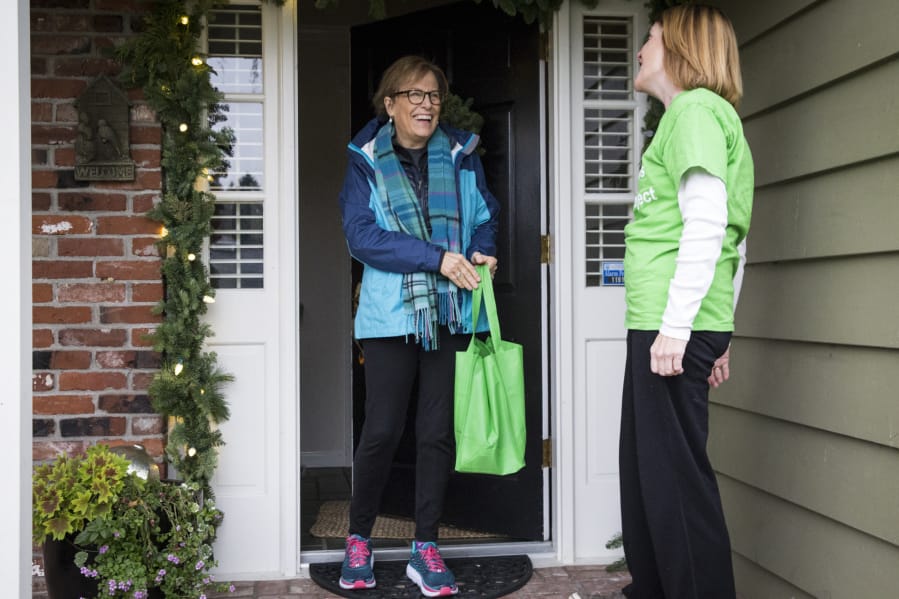Debbie Nelson knows all too well that neighbors often get together to complain.
People in her neighborhood, Truman, were at odds over how to address public safety issues. In March 2017, sheriff’s deputies attended a contentious neighborhood association meeting to keep the peace, according to Columbian archives.
“It got ugly,” Nelson said. “Things have gotten really divisive in our community sometimes, and our country.”
But, when Nelson helped start the Clark Neighbors Food Project, it didn’t matter which side of the issue her neighbors were on — the vast majority wanted to help their neighbors in need. The project works like this: On the second Saturday of every even-numbered month, a group of volunteers collects reusable green bags full of food donations from their neighbors’ doorsteps, leaves empty green bags in their place and hauls the food to Truman Elementary School where it’s distributed to food pantries, namely FISH of Vancouver and two schools’ family-community resource centers.
At the first drive in August 2017, four volunteers collected 375 pounds of food. Most recently, on Saturday, Dec. 8, about 50 volunteers collected 5,360 pounds of food.
The Clark Neighbors Food Project launched in Truman but grew tentacles in Cascade Park, Salmon Creek, Hazel Dell, Vancouver Heights and Battle Ground. And there is a particularly active group in Ridgefield.
Nelson is quick to classify it as more of a donor drive than a food drive. It’s almost an excuse for neighbors to meet and do something positive together by providing pantries a steady supply of food, she said.
“It’s feeling a lot more like a real neighborhood to me,” said Nelson, who’s lived in Truman for 30 years. “It’s really about building relationships and connections. It gives people an excuse for saying ‘hello.’ ”
It’s easy for neighbors to go about their lives without connecting. Through the Clark Neighbors Food Project, Nelson said she’s met more people and seen friendships form.
The advice given to donors is to buy one extra item when grocery shopping and place it in the green Clark Neighbors Food Project bag; by the time the bimonthly drive rolls around, the bag will be full. A computer program tracks donors’ contact information to make it easy to send reminder emails and organize driving routes to pick up food.
“This is such an easy thing to do,” Nelson said.
Katlin Smith, FISH’s board president, said the Clark Neighbors Food Project helps supplement what the westside pantry gets through annual, one-day food drives like Walk & Knock and the Letter Carriers’ Stamp Out Hunger Food Drive.
“We look forward to it every other month,” she said.
Clark Neighbors Food Project is technically a branch of The Food Project, a larger organization that began in Ashland, Ore., in 2009. The model has been adopted by cities such as Portland, Phoenix, Berkley, Calif., Medford, Ore., and Talent, Ore.
Visiting some friends in Ashland was what prompted Nelson to start a Clark County branch. She asked her friends about a green bag they had in their kitchen and they explained the food collection and how it benefits their neighborhood.
“It’s really transformed their neighborhood and it’s changed their dynamics and really made them neighbors,” Nelson said. “I got excited about that whole idea of building community with neighbors, of doing something positive rather than negative.”
Ashland residents deliver more than 25,000 pounds of food to the Ashland Emergency Food Bank every other month. About one in four households are participating, according to their website.
Ridgefield residents got involved in February. Bill Baumann, who worked with Nelson on the Clark County project for several months prior, knocked on doors in the Wishing Wells neighborhood with his daughter and a friend, hoping to sign up a handful of donors.
The small city now has a handful of coordinators and collects the most food of any area. However, residents said they wanted the collected food to stay in Ridgefield.
“People were really focused on the idea of the food staying local,” Baumann said.
Ridgefield’s collections go to the Ridgefield School District and Neighbors Helping Neighbors, a food and clothing pantry serving Ridgefield, La Center, Felida and Salmon Creek.
Nelson said groups can hyper-localize their efforts, bringing donations to whichever food pantry they want. Coordinators can ask pantries what they specifically need and email donors asking for those foods.
“They are the items that are in high demand,” said Smith. FISH often asks for peanut butter, beans, oatmeal, spaghetti, cereals, diapers, paper goods and canned meat, vegetables and soup.
Anyone interested in signing on as a Clark Neighbors Food Project volunteer or a coordinator can get the materials and training provided. People don’t have to organize amongst their neighbors, either, at least in the geographic sense. It could be centered around a book or service club, a hiking group or church members, and the size of the group doesn’t matter, either.
“Some food is always going to be better than no food,” Baumann said.
The next drive is Saturday, Feb. 9.




